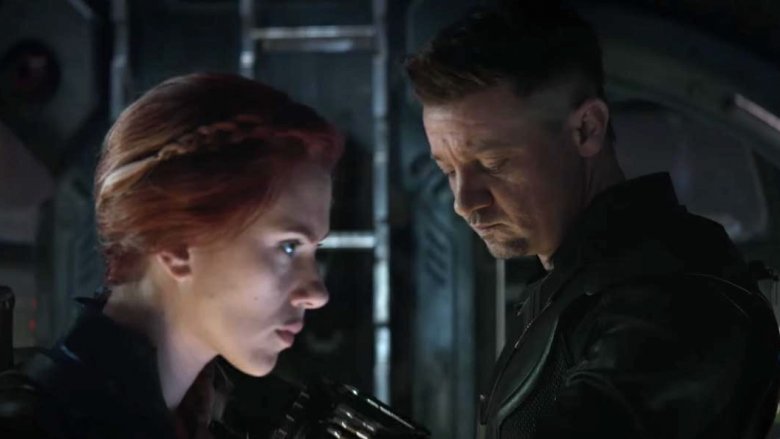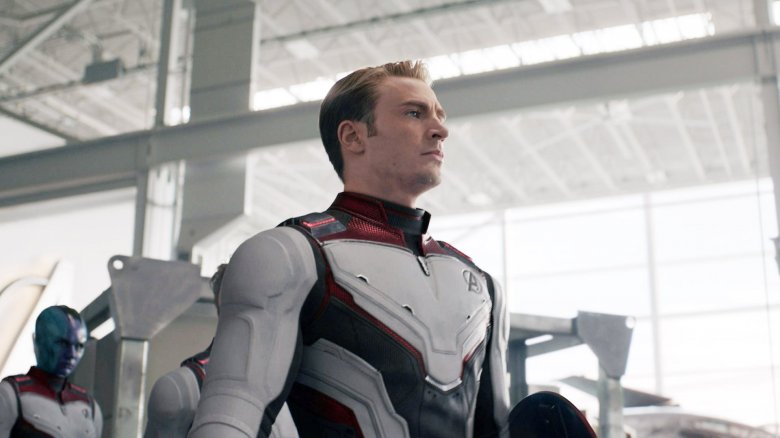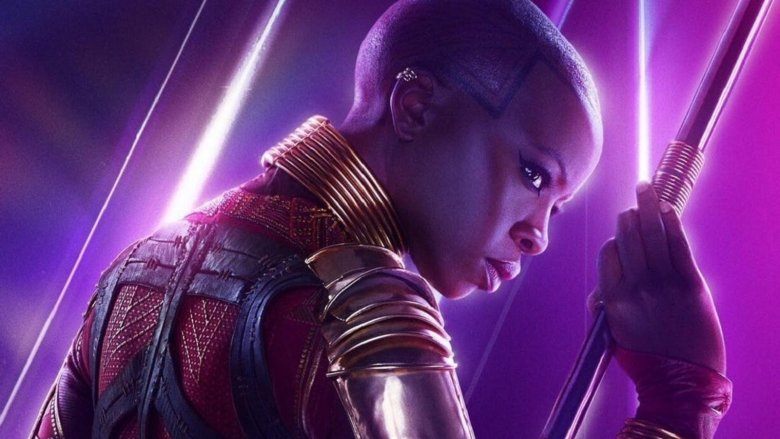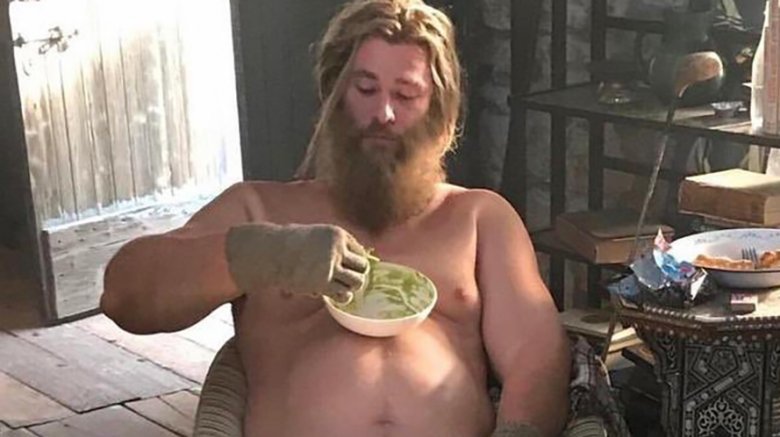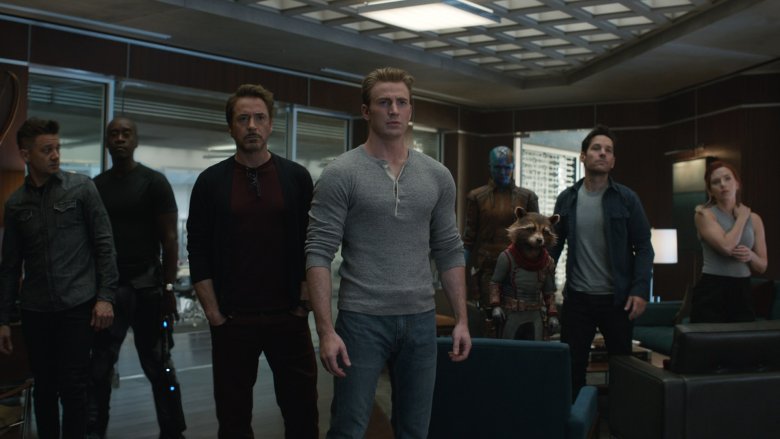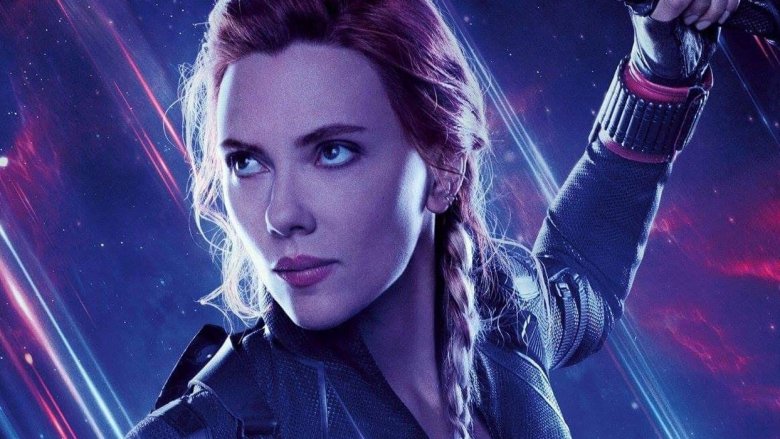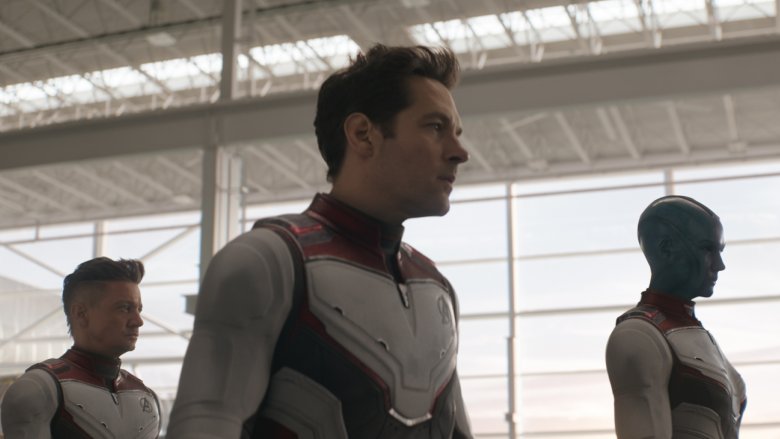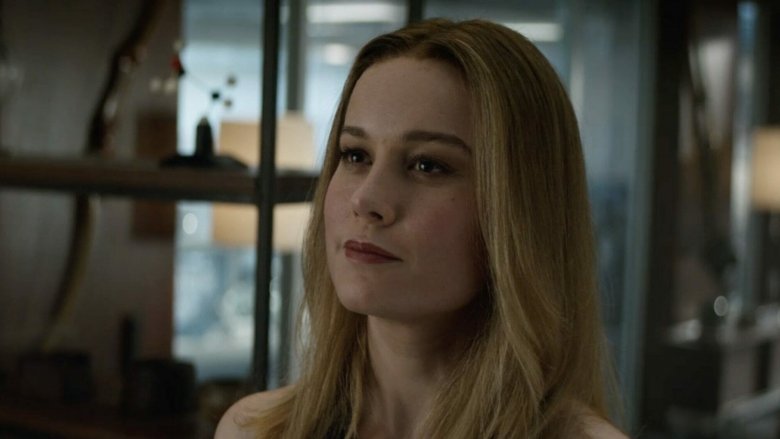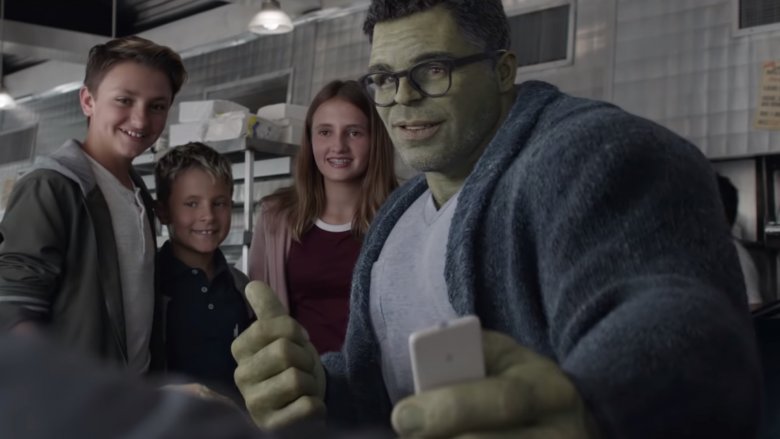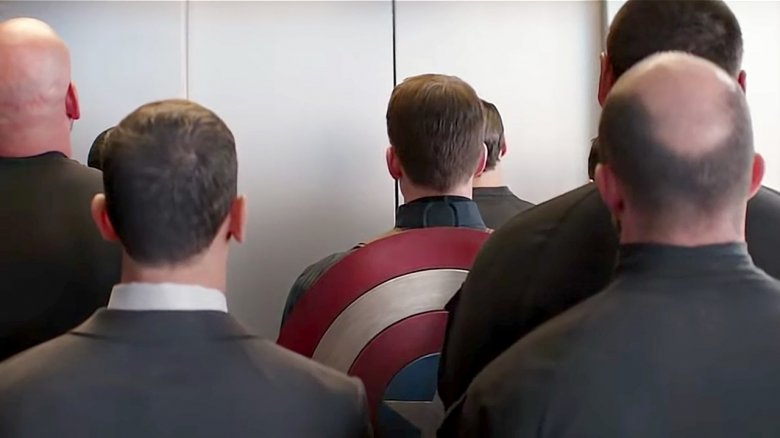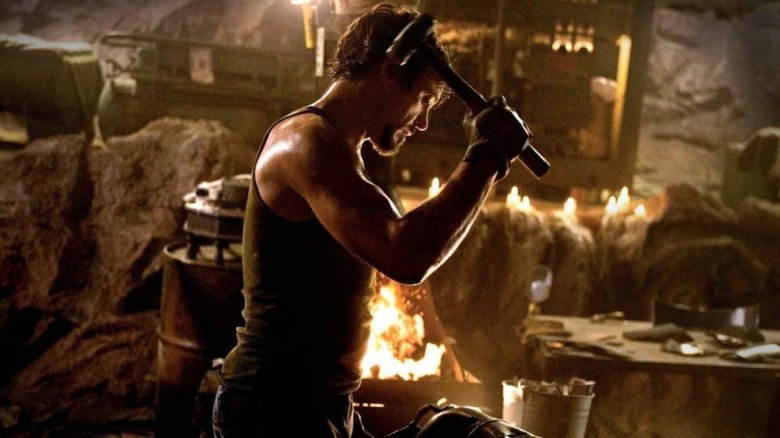Here's Why These Avengers: Endgame Moments Upset Fans
Avengers: Endgame has racked up some incredible box office numbers since making its highly anticipated theatrical debut, but that doesn't mean the movie left every corner of the massive Marvel fanbase completely satisfied. It's easy to understand why: The film serves as the end of an era, concluding arcs for characters that fans of the Marvel Cinematic Universe have come to know and love over the course of more than a decade. Now we're not entirely sure what's in store for the superheroes who prevailed, with Marvel keeping mum on what the next big thing in the MCU is going to be — and some moviegoers don't even know if they really liked the way the Infinity Saga ended. In the wake of Endgame, MCU fandom is experiencing its very own civil war.
Although Endgame has blown up the box office and earned widespread critical acclaim, plenty of fans are still upset — over plot holes, seemingly out-of-character moments, and jokes that, for some, marred what was supposed to be a satisfying end to a story 22 films in the making. In a three-hour film there's plenty of room for controversy — here's a look at the Avengers: Endgame moments that left fans most upset.
#NotMySteve
Steve Rogers and his best friend Bucky Barnes saved each other from a number of sticky situations: from scraps with jerks in alleyways to the brutal battles of World War II, they were in it together "'til the end of the line." Rogers' dedication to his friend is what drove the infamous civil war that split the Avengers asunder and even Endgame called back to this powerful friendship — in their time travel-enabled battle, the only way for present Cap to defeat a past version of himself is by stupefying him with the fact that Bucky is alive.
All this in mind, some fans felt cheated when Rogers used his mission to return the Infinity Stones to their various points in history to leave Bucky behind and live out a normal life with Peggy Carter. Salt in the wound: an aged Captain America's final conversation is with Sam Wilson rather than his best friend, who looks on silently. Didn't Bucky deserve a quiet moment with his old friend? This grievance was aired via Twitter with the hashtag #NotMySteve, with tweeters arguing that Rogers' choice was out of character. After all, we have quotes like this one from Chris Evans himself about Steve and Bucky: "It's one of the few relationships that he can identify as anything we would call home."
A forced moment of girl power?
Endgame's fight scenes are epic and awesome. Captain America swinging around Mjolnir? Captain Marvel unflinchingly taking a headbutt from Thanos? Valkyrie, Scarlet Witch, Shuri, and Nebula coming together to protect little Peter Parker from Thanos? All moments that made Marvel fans want to stand up and cheer.
Well... maybe not so much. The latter scene, a so-called "girl power" moment, has been called empowering by some and pandering by others. When these powerful women of the MCU showed off their might, some fans felt that the team-up was a forced political statement, while still others got goosebumps. The screenwriters apparently anticipated that there would be a divided reaction to the scene, too: In an interview with the New York Times, writer Stephen McFeely admitted, "There was much conversation. Is that delightful or is it pandering? We went around and around on that. Ultimately we went, 'We like it too much.'"
Marvel took its sweet time with making a female-fronted superhero film, so maybe this was one attempt to make up for the MCU's shortcomings when it comes to giving screen time to its superpowered ladies. Endgame has also weathered criticism for the measly screentime given to fan favorite Okoye, who was originally excluded from the film's posters.
Let's stop with the Thor fat jokes
When the Guardians of the Galaxy picked up Thor in Infinity War, they marveled over his unconscious body, touching his muscles and saying he was some kind of pirate angel. (He's an Asgardian god, but close enough.) The Thor that we see in Endgame five years after Thanos' Decimation is markedly different. Filled with loss and guilt, Thor isolated himself and numbed the pain with alcohol and Fortnite. Such a lifestyle wreaked havoc on his godly body and left him with a beer belly. But hey, his depression is hilarious, right?
That's the message that some fans felt was being put across when Thor became the butt of quite a few fat jokes sprinkled into Endgame's script. It's 2019 and the biggest film of the year is relying on fat jokes about Cheez Whiz that are just about as outdated as... a can of Cheez Whiz. With his weight gain and scraggly beard, Thor's struggles with PTSD and a feeling of unworthiness were played largely for laughs, and many fans thought this was a pretty tactless, body-shaming take that made the film less enjoyable — while others found it a step in the right direction by realistically portraying a common response to trauma and depression. Either way, Thor seemed to be comfortable in his body and was still seriously badass when he attacked Thanos — big beard, beer belly, and all.
A step forward or a stumble?
Marvel had tremendous success with Black Panther, the first black-led superhero movie, and Captain Marvel, the MCU's first female-led film. Important first steps toward inclusion, the films were both financial and critical hits. Considering this record, it's about time for an LGBT superhero, right?
Endgame debuted the MCU's very first canonically gay character, something you may have missed if you blinked. Played by co-director Joe Russo, the unnamed man talked about a disastrous date in a group therapy session led by Steve Rogers. In an interview with Deadline, Russo talked about the importance of representation, saying, "It was important to us as we did four of these films, we wanted a gay character somewhere in them. We felt it was important that one of us play him, to ensure the integrity and show it is so important to the filmmakers that one of us is representing that."
Some people reacted to this minuscule moment with scorn, however. An itty bitty cameo hyped up by big headlines wasn't a satisfying first appearance of a gay character, especially when some fans expected a named character like Valkyrie or even Captain Marvel to come out. The inclusion of a few moments of LGBT representation on screen only served to remind audiences that there is little to no LGBT representation in the MCU to begin with.
Black Widow was fridged
For a long time, a number of fans have been bitter with the MCU over the treatment of Black Widow. Her story sidelined in favor of other heroes, we've long waited for news of a solo adventure shining more of a spotlight on Natasha Romanoff's journey as an assassin and spy. Endgame killed those hopes — and Black Widow herself. Deaths of major characters will always be controversial, met with outcries from diehard fans, but Black Widow's end rankled because some felt it fell into a particularly tired trope: fridging, which refers to the practice of killing women in order to incite a response or motivation in men, which is what fans are saying happened with Black Widow.
Although Endgame gives Black Widow fairly significant screentime — she's the nerve center of the Avengers HQ after the Decimation, keeping tabs on the scattered heroes, and she's also the one who brings Clint Barton in from the cold during his quest for vengeance as Ronin. The two are paired up on a quest to obtain the Soul Stone from Vormir, but some fans were unhappy about the way it ended — with Natasha sacrificing herself so Barton can head back to the present with the Stone. While this is a heroic self-sacrifice that serves the Avengers' ultimate goal — and in line with her long-expressed wish to balance the karmic scales tipped by the sins of the past on her "ledger" — fans took to Twitter to say she deserved better, not to mention the honor of an onscreen funeral.
Time travel begets plot holes
Time travel in the movies has never been an exact science, and no matter how closely you investigate a movie's details, it's almost impossible to really understand it fully. Ant-Man returns from the Quantum Realm just in time to help the Avengers get so itty bitty that they go backward in time... because science. With us so far? The "time heist" in Endgame has the Avengers pairing off as they travel back in time to the various moments in MCU history when they knew exactly where to locate the Infinity Stones. In order to prevent the creation of a zillion alternate timelines, they have to then return the Stones to the precise moment they were taken.
Like most things, this is easier said than done. Steve Rogers is the man for the job, jumping from 2023 to 2014, 2012, and the '40s, where he then decides to stay and get a life. Somehow, this doesn't cause an alternate timeline despite breaking the rules that were set out by the film: if you travel to the past, that past becomes your future. The present and future can't be changed. Are there multiple Peggys to now match the multiple Steves? Where did he get that shield, so shiny and new after Thanos snapped it in two? It's kind of disappointing that Endgame went through so much trouble to lay out the rules of time travel, only to seemingly throw them away in the final act.
Captain Marvel's glammed up look
Months before Endgame came out, fans eagerly analyzed every available morsel of information about the film. Each trailer was scrutinized and we broke out our magnifying glasses for the end credits scene in Captain Marvel (the one with where the Avengers meet Captain Marvel, not the one with the Tesseract hairball). What fans found there turned out to be controversial.
In Captain Marvel, Carol Danvers didn't wear lipstick. In the glimpse into Endgame, she looked like she had visited a Sephora before checking in with Nick Fury's pager, and this rubbed fans the wrong way. Some felt that this glammed-up look was out of character, and were worried that her character wouldn't be the badass, show-stealing force of nature that they loved in her solo film. As it turned out, her appearance in Endgame had been filmed prior to Captain Marvel, when Brie Larson was still figuring out the character of Carol Danvers. Co-directors the Russo brothers assured upset fans that she'd had creative control over her makeup, but the whole controversy underscored how hard it can be to embrace diversity and inclusion while satisfying all corners of a worldwide fanbase.
Hulk is gone, story unresolved
One of the most important scenes in Infinity War showed the Hulk, previously undefeated, getting his green butt handed to him by Thanos' purple fist. After that throwdown, Hulk refused to come out and help in the fight against the Mad Titan. We didn't know it then, but the Hulk getting flung into space by Heimdall was the last time we'd see the big green guy as we'd come to know him.
In Endgame, Banner and the Hulk have fused into a being with Banner's personality and brains and the Hulk's body and brawn — dubbed "Professor Hulk" by fans of the comics who were familiar with a similar iteration of the character. Those who'd come to love his grunts and fits of destruction were disappointed to find that with Banner in charge, there would be no more smashing big monsters. The conflict between Banner and the Hulk was essentially resolved offscreen. Sure, it was cool to see Professor Hulk dab — and there's no discounting the fact that it was Hulk's gamma-infused body that ended up bearing the brunt of the Infinity Stones' power when he undid Thanos' snap — but fans were disappointed that a character had essentially been erased. A secret death of the film, in a sense. RIP Hulk.
Hail HYDRA
The MCU is of course based in comics, so it's natural to expect a couple callbacks to the printed pages that started it all. However, Endgame makes a reference to a series of comics that has something of an... infamous reputation. Captain America, beacon of freedom and the American way, steps onto an elevator crowded with S.H.I.E.L.D. agents. Rather than throwing down as he did in Winter Soldier, he simply whispers "Hail HYDRA" in order to get what he wants.
We know from the films that S.H.I.E.L.D. had been infiltrated by the organization at this point, but that line was also a callback to the 2017 Secret Empire series wherein it was revealed that Captain America was on the side of HYDRA all along. Fans mutinied against a beloved character created by Jewish American immigrants being made a part of a pseudo-Nazi conspiracy, and the panel of the ill-received reveal was meme-ed into oblivion. Calling attention to it brought back old gripes and new complaints of a focus on fan service. Were casual fans meant to know the controversial history behind the quote? Maybe more focus should have been given to jokes that everyone was in on.
A Saga that ends not with a bang, but a... clang?
Since 2008 we've been trained to dig into the very last crumbs of our popcorn and suck fruitlessly at our empty sodas when the credits roll on an MCU movie. We get comfortable because we know that there's one final tidbit waiting for us, like an after dinner mint. End credits scenes give us a glimpse of what's next or just a fun bonus scene that feels like an inside joke. It's a classic part of the Marvel movie experience.
All of which is why a number of fans felt betrayed when the credits rolled, kept rolling, and faded to black on Avengers: Endgame. Although audiences were willing to keep waiting, there was originally no end credits scene, just a clanging sound that seems to serve as a subtle audio callback to Iron Man, the movie that started it all. Fitting as this may have been, outrage over the absence of any indication of what's next is perhaps what prompted Marvel to add the second trailer for Spider-Man: Far From Home as the end credits scene in later screenings. As good as Endgame is, it was never going to satisfy everyone — and a black screen was not what some fans wanted from the end of an era.
